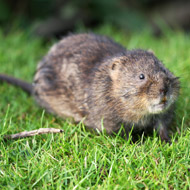Public urged to report water vole sightings

Water voles were once a common site along UK riverbanks and waterways.
A conservation charity is calling on the British public to help survey endangered water voles.
The People’s Trust for Endangered Species (PTES) has made the plea as part of its annual National Water Vole Monitoring Programme (NWVMP). Now in its fourth year, the programme was launched in response to a severe decline in water vole populations.
Emily Thomas, key species, monitoring and data officer at PTES, said that volunteers are crucial to helping the charity collect robust data about the state of water voles across the UK.
“We use the data gathered to monitor population trends year on year, which in turn help guide our conservation efforts and inform us where action is needed most,” she said.
Water voles were once a common site along UK riverbanks and waterways. But thanks to habitat loss, river pollution and American mink, the species has seen a dramatic fall in numbers.
More than 200 volunteers have taken part in the NWVMP since its launch in 2015. Last year, participants collected data from 222 sites across England, Scotland and Wales, of which 82 showed signs of water voles.
This year, volunteers will be asked to survey one of nearly 900 sites across the UK, recording all sightings and signs of the species along a 500m length of a riverbank. The recording only needs to take place once during the course of the programme (15 April-15 June) and no prior experience is required.
To find out more about the programme and how you can get involved, visit ptes.org/get-involved/surveys/countryside-2/national-water-vole-monitoring-programme/



 RCVS Knowledge has welcomed Professor Peter Cockcroft as editor-in-chief for Veterinary Evidence.
RCVS Knowledge has welcomed Professor Peter Cockcroft as editor-in-chief for Veterinary Evidence.